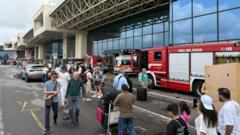In recent weeks, Haiti has experienced a troubling rise in gang violence, prompting international aid organizations, including the United Nations, to reassess their operations within the nation. A striking example is the suspension of activities by Doctors Without Borders in Port-au-Prince, which has historically provided critical medical support. Escalating fears in the capital stem from attacks on foreign airliners, resulting in the closure of the international airport to commercial flights.
**Haiti's Deteriorating Situation: International Aid Agencies Withdraw Amid Escalating Violence**

**Haiti's Deteriorating Situation: International Aid Agencies Withdraw Amid Escalating Violence**
As gang violence surges in Haiti, global aid organizations reconsider their presence in the country, alarming local populations relying on their support.
The deteriorating security situation has led to the evacuation of personnel from the U.N., with helicopters transporting workers out of the country in groups of 14. This move has sparked concern among the local population, many of whom view the U.N. as a lifeline amid a growing crisis. Dr. Wesner Junior Jacotin, a critical care physician, voiced this anxiety, questioning what happens to those who cannot escape the instability.
The gang-related violence has significantly increased since the assassination of Haiti's last president over three years ago, and with many international actors pulling back, fears of abandonment by the global community are prevalent among Haitians. The withdrawal of aid organizations is creating uncertainty, leaving residents grappling with the question of who will address the rising violence and humanitarian needs in their country.
The gang-related violence has significantly increased since the assassination of Haiti's last president over three years ago, and with many international actors pulling back, fears of abandonment by the global community are prevalent among Haitians. The withdrawal of aid organizations is creating uncertainty, leaving residents grappling with the question of who will address the rising violence and humanitarian needs in their country.



















